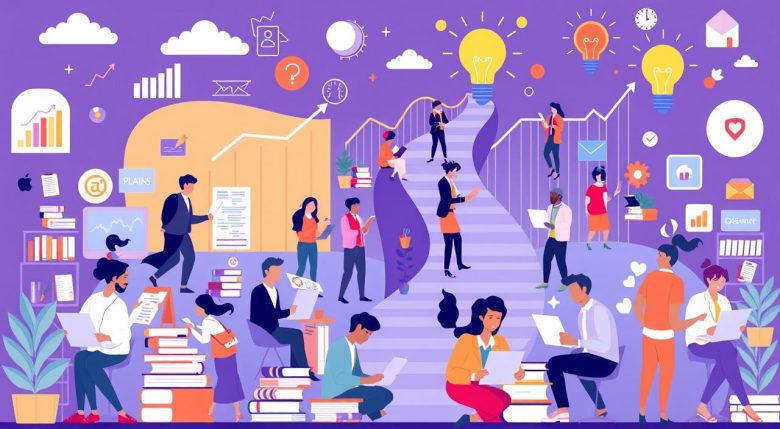Did you know over half of all workers see career growth as key to their job satisfaction? But in today’s fast-changing job world, just showing up isn’t enough. You need to keep learning. This is key for staying up-to-date with industry trends, improving your job chances, and growing professionally.
In a world where technology and society change fast, the only thing that stays the same is change. So, learning continuously is not just a choice; it’s a must. If you want to stay ahead, keep learning. Those who do are better at handling job market challenges and grabbing new chances. Learning is the key to success in your career, now and in the future.
Key Takeaways
- Lifelong learning is key for career growth and staying relevant in the job market.
- Continuous education helps you adapt to new trends and changes in your field.
- Staying in school helps improve your job prospects.
- Education is essential for career success and resilience.
- Always seeking knowledge is crucial to stay competitive in your career.
The Importance of Lifelong Learning in Personal Growth
Learning for life is key for growing personally and professionally. It makes our lives richer, broadens our world view, and helps us grow. We’ll explore how ongoing education boosts self-improvement and brain power, with examples to show its impact.
The Role of Continuous Learning in Self-Improvement
Learning never stops is a big part of getting better at ourselves. It helps us learn new things, boosting our confidence and outlook. It’s not just for work; it’s for personal growth and happiness too.
How Lifelong Education Enhances Cognitive Abilities
Staying in school for life is good for our brains. It keeps them sharp and active, helping to fight off brain aging. Learning new things also sharpens our memory, problem-solving, and thinking skills.
Success Stories: Individuals Who Embrace Lifelong Learning
Many have changed their lives by learning for life. For example, older folks learning to code have landed jobs in tech. Their stories show how education can change lives at any age.
| Age Group | Learning Focus | Benefits Experienced |
|---|---|---|
| 30-45 | Advanced Degrees | Higher Earnings, Career Advancement |
| 45-60 | Technology Skills | Increased Employability, New Career Paths |
| 60+ | Recreational Learning | Improved Cognitive Functions, Social Engagement |
Navigating Career Changes with Continuous Education
Starting a new career change can seem scary, but education helps a lot. As jobs change, learning new skills makes moving to different career paths easier. This part talks about how learning for life helps you grow in changing work worlds.

With the job market always changing, learning never stops. It helps people get better at things employers want. By getting more training and certifications, you can move to areas that are doing well or will grow.
- Technology and digital transformation courses for transitioning into IT and digital marketing roles.
- Certifications in project management to enhance organizational and leadership capabilities.
- Healthcare advancements through specialized courses, preparing individuals for roles in a booming healthcare sector.
Career changes need you to be ready to change. Education keeps you flexible and ready for new things. It helps you stay important and keep up with others.
Continuous Education as a Strategy for Career Resilience
In today’s fast-changing job market, continuous education is key to career resilience. It helps you adapt to new technologies and market changes. It also boosts your career and professional growth.
Professional development through continuous education lets you control your career path. You can easily move between roles or industries as needed. It prepares you to lead and be a valuable asset in your company.
Continuous education also helps you learn new skills that future markets will need. As industries get more complex and global, you must keep up with new trends and skills. This is vital for staying competitive and advancing in your career.
| Benefit | Outcome |
|---|---|
| Enhanced Skill Set | Increases adaptability and competitiveness |
| Updated Industry Knowledge | Keeps professionals relevant and reduces the risk of obsolescence |
| Networking Opportunities | Expands professional networks, opening up new career paths |
| Leadership Skills | Prepares for advanced roles and challenges within the industry |

To make continuous education work for your career, set clear goals. These goals should match your long-term career dreams and the job market’s needs. This way, you not only adapt but also prepare for future career opportunities.
In summary, continuous education is more than just getting credits or certifications. It’s about building a proactive and resilient career. Through focused learning, you stay relevant, adaptable, and ready for success in your career.
Expanding Employment Prospects Through Continuous Learning
The job world is always changing, making it crucial to keep learning. By improving your skills, you can open up more job chances and stay ahead in the job hunt.
Linking New Skills to Job Opportunities
In today’s fast-paced job market, skills and jobs are closely linked. Those who keep learning are ready for new job chances as industries and tech grow. For example, learning about digital skills can lead to jobs in tech, marketing, and data analysis, areas that are booming.
Setting the Stage for Promotion and Career Advancement
Learning continuously not only widens your job options but also helps you move up in your career. Employers value workers who keep learning and often reward them with promotions and more responsibilities. This leads to better job security and higher pay. So, learning continuously helps you grow in your career.
The Impact of Ongoing Training on One’s Professional Development
Ongoing training does more than just help you find a job. It keeps you up-to-date with your field and makes you more valuable in your role. This makes you a key player in a productive, innovative team. Clearly, learning continuously is key to finding jobs now and in the future.
Conclusion
In today’s fast-changing job market, the idea of always growing is clear. Lifelong learning is key to career growth. It builds a strong base for professional success and opens many doors.
Being adaptable, thanks to constant learning, is crucial for your career. It’s not just about learning new things. It’s about staying flexible and ready for change. This is true whether you’re looking to switch careers or move up in your current one.
This article ends with a call to think about education’s power. Learning is a journey that never ends and is very valuable. By always learning, we improve our careers and help make the job market better. Start this lifelong learning journey for a better future for yourself.



